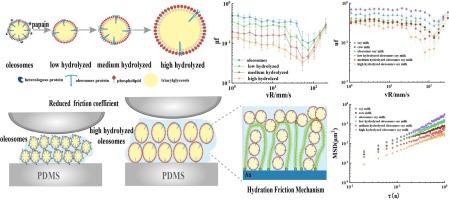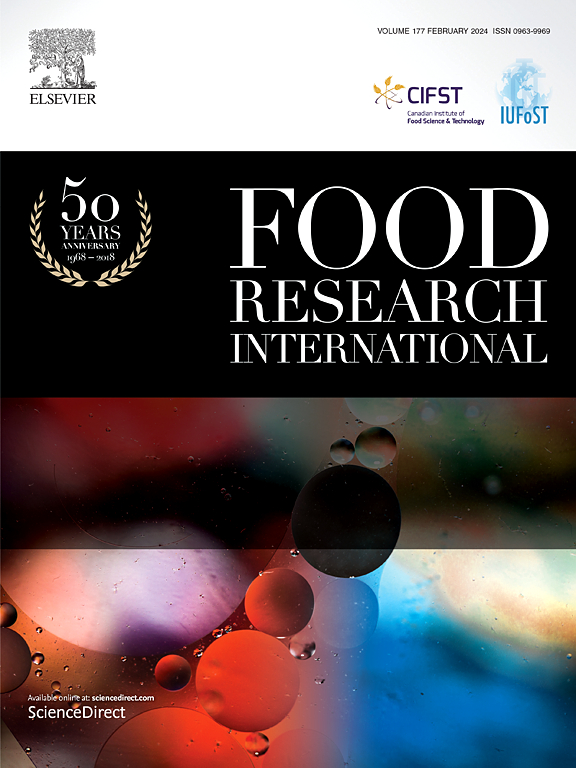通过富集木瓜蛋白酶水解油脂体增强植物基牛奶的奶油味
IF 7
1区 农林科学
Q1 FOOD SCIENCE & TECHNOLOGY
引用次数: 0
摘要
出于对道德、健康和环保的考虑,消费者对植物奶的需求日益增加,以替代牛奶。然而,作为主要属性的奶油感给消费者接受这些牛奶替代品带来了巨大挑战。在这项研究中,我们开发了一种新颖且易于推广的策略,通过富集油脂体来增强豆奶的奶香。用木瓜蛋白酶提取并水解大豆油脂体奶油,形成表面磷脂较多、蛋白质较少的油滴,从而显著降低了唾液存在时的摩擦系数(速度约为 50 毫米/秒时,摩擦系数从 0.15 降至 0.03)。此外,将木瓜蛋白酶水解的油脂体奶油与生豆奶混合在一起,还能制造出一种植物基牛奶,其营养成分、润滑性能和奶油香味均可与全脂牛奶媲美。利用 QCM-D 和被动微流变学表征了油脂体进入粘蛋白层的水合作用和相关粘度变化,表明木瓜蛋白酶水解油脂体可能通过水合润滑机制降低摩擦系数。这种方法可用于增强植物基牛奶的奶油口感和营养成分。本文章由计算机程序翻译,如有差异,请以英文原文为准。

Enhanced creaminess of plant-based milk via enrichment of papain hydrolyzed oleosomes
There is an increased consumer demand for plant-based milk in substituting dairy milk due to the ethical, health concerns and environmentally-friendly choice. However, perceived creaminess as dominant attributes present a big challenge in consumer acceptance for those milk alternatives. In this study, we developed a novel and easily scalable strategy to enhance the creaminess of soy milk via enrichment of oleosomes. The soybean oleosome creams were extracted and hydrolyzed with papain, resulting in formation of oil droplets with more phospholipid and less protein at the surface, which significantly reduce friction coefficient in the presence of saliva (from 0.15 to 0.03 at a speed around 50 mm/s). Moreover, blending papain-hydrolyzed oleosome creams with raw soy milk enables the creation of a plant-based milk that matches the nutritional profile, lubrication properties, and creaminess of full-fat dairy milk. QCM-D and passive microrheology were employed to characterize hydration of oleosomes into the mucin layer and relevant viscosity change, suggesting that papain hydrolyzed oleosome might decrease friction coefficient via hydration lubrication mechanism. This approach could be applied to enhance the creaminess mouthfeel and nutritional profile of plant-based milk.
求助全文
通过发布文献求助,成功后即可免费获取论文全文。
去求助
来源期刊

Food Research International
工程技术-食品科技
CiteScore
12.50
自引率
7.40%
发文量
1183
审稿时长
79 days
期刊介绍:
Food Research International serves as a rapid dissemination platform for significant and impactful research in food science, technology, engineering, and nutrition. The journal focuses on publishing novel, high-quality, and high-impact review papers, original research papers, and letters to the editors across various disciplines in the science and technology of food. Additionally, it follows a policy of publishing special issues on topical and emergent subjects in food research or related areas. Selected, peer-reviewed papers from scientific meetings, workshops, and conferences on the science, technology, and engineering of foods are also featured in special issues.
 求助内容:
求助内容: 应助结果提醒方式:
应助结果提醒方式:


